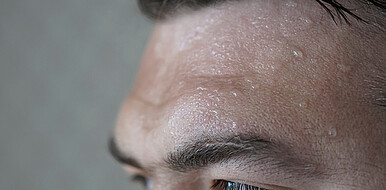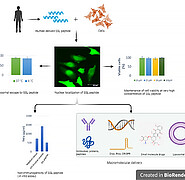Cellular delivery of bioactive molecules

Cell-penetrating peptides (CPPs) are an innovative therapeutic approach to deliver bioactive molecules into cells. The discovery of peptides of human origin, such as those from human skin, as cellular carriers opens up a wide range of new possibilities for pharmacological and biotechnological applications.
State of the Art
Transdermal delivery of active molecules via the skin is currently the second most important route of administration for therapeutics or cosmetics. Numerous therapeutic peptides are therefore being tested in clinical trials: Not only with regard to medication to treat e.g. hearing loss, muscular dystrophy, pain and cancer, but also for their ability to act as CPPs. One of the biggest challenges in delivery of active agents into human cells is to cross the cell membrane. Therefore, the CPP drug complex has to be able to cross the hydrophobic core of the membrane without inducing any damage. Occurring membrane damage, toxic side effects or immunogenic response have so far limited the use of CPPs as delivery agents.
Technology
Researchers of the Institute of Biological Interfaces 2 - Molecular Biophysics (IBG-2) at the Chair of Biochemistry (IOC) of KIT have discovered that a group of peptides – so-called dermcidins (DCD / SSL family) – contrary to their originally described antimicrobial effect, instead exhibit efficient cell penetrating properties. Since these peptides are already present in human sweat or skin, they do not induce any immune response. They have been used to deliver peptides, DNA or enzymes into cells without causing any side effects. Dermcidin-derived peptide sequences are therefore suitable as transport systems for a wide range of therapeutic or cosmetic agents.
Advantages
The peptides described are evolutionary optimized and are continuously produced in the human sweat glands. They are neither immunogenic nor toxic and can thus easily cross cell membranes. Optimized peptide sequences proved to be efficient CPPs. Their easy synthesis and natural occurrence in human skin, in particular, would ease their FDA approval as drug delivery agents.
Options for companies
The cell-penetrating dermcidins can be used in the cosmetics, dermatology, pharmaceuticals, and biotechnology. KIT is looking for partners for application-specific development projects as well as for licensing.
Images close open
Your contact person for this offer

Innovation Manager New Materials and Health Technologies Karlsruhe Institute of Technology (KIT)
Innovation and Relations Management (IRM) Phone: +49 721 608-26107
Email: jan-niklas.bloetz@kit.edu

